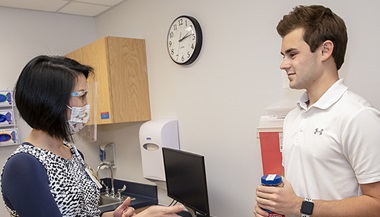Tourettes Disorder
What is Tourette disorder in children?
Tourette disorder (TD) is a neurological disorder. It is also called Tourette syndrome (TS). The disorder causes repeated tics. Tics are sudden, uncontrolled vocal sounds or muscle jerks. Symptoms of TD often begin between ages 5 and 10. They usually start with mild, simple tics of the face, head, or arms. Over time, a child may have different kinds of tics that may happen more often. They may also involve more parts of the body, such as the trunk (torso) or legs. And they may be more disruptive to daily life.
What causes Tourette disorder in a child?
Most cases of Tourette disorder are caused by genes. It is an autosomal dominant disorder. Autosomal means that both boys and girls are affected. Dominant means that only 1 copy of the gene is needed to have the condition. A parent with TD or the gene for TD has a 1 in 2 chance to pass the gene on to each child.
In up to 1 in 20 children with TD, the disorder is not caused by genes. Possible causes in these cases may be problems during pregnancy, low birth weight, head injury, carbon monoxide poisoning, or inflammation of the brain (encephalitis).
Which children are at risk for Tourette disorder?
TD affects more boys than girls.
What are the symptoms of Tourette disorder in a child?
The most common symptoms are uncontrolled muscle movements. They may occur in the face, neck, shoulders, torso, or hands. Examples include:
- Head jerking
- Squinting
- Blinking
- Shrugging
- Grimacing
- Nose-twitching
- Repeated foot tapping, leg jerking, scratching, or other movements
Complex tics include:
- Kissing
- Pinching
- Sticking out the tongue or lip-smacking
- Touching behaviors
- Making rude gestures
TD also includes one or more vocal tics such as:
- Grunting or moaning sounds
- Barking
- Tongue clicking
- Sniffing
- Hooting
- Saying rude things
- Throat clearing, snorting, or coughing
- Squeaking noises
- Hissing
- Spitting
- Whistling
- Gurgling
- Echoing sounds or phrases repeatedly
Tic behaviors change over time. They also vary in how often they occur.
TD can occur differently in boys and girls. Boys are more likely to have long-term (chronic) tics. Girls are more likely to have obsessive-compulsive disorder (OCD). This is an anxiety disorder. With OCD, a child has a repeated thought, fear, or worry (obsession) that he or she tries to manage through a certain behavior (compulsion) to reduce the anxiety.
Not everyone with the gene will have symptoms of Tourette disorder. If a parent passes the gene to a child, the child may not have any symptoms. If a daughter inherits the gene, there is a 7 in 10 chance that she will have at least one sign of TD. If a son inherits the gene, there is an almost sure chance (99%) chance that he will have at least one sign of TD.
The symptoms of TD can be like other health conditions. Make sure your child sees his or her healthcare provider for a diagnosis.
How is Tourette disorder diagnosed in a child?
A child with TD is usually diagnosed around the age of 7. A primary care provider, pediatrician, child psychiatrist, or a mental healthcare provider may diagnose your child. The healthcare provider will ask about:
- Your child’s symptoms and health history
- Your family’s health history
- Developmental problems
The healthcare provider will also:
- Watch your child's behavior
- Ask for a history of your child's behavior from teachers
- Assess your child’s psychological, social, and educational status
How is Tourette disorder treated in a child?
Treatment will depend on your child’s symptoms, age, and general health. It will also depend on how severe the condition is. Some children may not need treatment. A child with TD can usually function well at home and in a regular classroom.
In some cases, a child may need special classes, psychotherapy, or medicine. These may be choices if:
- Tics cause problems with daily function or school
- Your child has a problem such as OCD or attention deficit/hyperactivity disorder (ADHD)
- Your child has another emotional or learning problem
A treatment called comprehensive behavioral intervention for tics can help children deal with tics and reduce tics.
Your child may need medicines if he or she has related conditions such as ADHD, OCD, or a mood disorder. Talk with your child’s healthcare providers about the risks, benefits, and possible side effects of all medicines.
What are the possible complications of Tourette disorder in a child?
Many children who have TD also have attention problems. Some have trouble in school. But most have normal intelligence and don’t have a learning disability.
Other conditions commonly seen in children with TD include behavior problems, mood changes, social challenges, and trouble sleeping.
How can I help prevent Tourette disorder in my child?
Your healthcare provider may advise genetic counseling. You can discuss with a counselor the risk for Tourette disorder in a future pregnancy.
How can I help my child live with Tourette disorder?
Your child may need support and help with:
- Self-esteem
- Relationships with family and friends
- Classroom participation
Talk with your child’s healthcare provider about the best ways to support your child.
When should I call my child’s healthcare provider?
Call the healthcare provider if your child has:
- Symptoms that don’t get better, or get worse
- New symptoms
Key points about Tourette disorder in children
- Tourette disorder (TD) is a neurological disorder. It affects more boys than girls.
- The disease causes repeated tics. These are sudden, uncontrolled vocal sounds or muscle jerks.
- Symptoms of TD often begin between ages 5 and 10.
- TD can occur differently in boys and girls. Boys are more likely to have long-term (chronic) tics. Girls are more likely to have obsessive-compulsive disorder (OCD).
- Some children may not need treatment. A child with TD can usually function well at home and in a regular classroom. In some cases, a child may need special classes, psychotherapy, or medicine.
- A family with a history of Tourette disorder should speak with a geneticist or a genetic counselor.
Next steps
Tips to help you get the most from a visit to your child’s healthcare provider:
- Know the reason for the visit and what you want to happen.
- Before your visit, write down questions you want answered.
- At the visit, write down the name of a new diagnosis, and any new medicines, treatments, or tests. Also write down any new instructions your provider gives you for your child.
- Know why a new medicine or treatment is prescribed and how it will help your child. Also know what the side effects are.
- Ask if your child’s condition can be treated in other ways.
- Know why a test or procedure is recommended and what the results could mean.
- Know what to expect if your child does not take the medicine or have the test or procedure.
- If your child has a follow-up appointment, write down the date, time, and purpose for that visit.
- Know how you can contact your child’s provider after office hours. This is important if your child becomes ill and you have questions or need advice.




